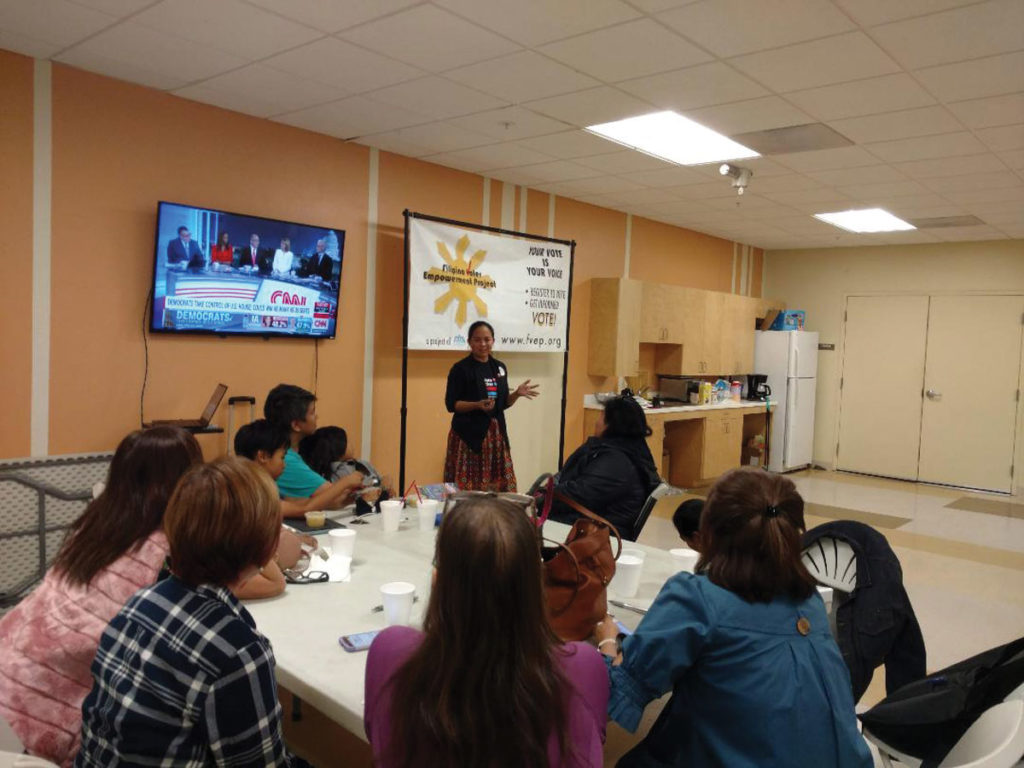
Filipinos are one of the largest Asian populations in the United States with a population exceeding four million. In California alone, 1.6 million Filipino Amercans all the state home, making them the largest Asian American and Pacific Islander group.
Yet despite the large numbers, Fil-Ams lack in civic engagement and political representation. Of the 19,432,609 registered voters in California, only 396,000 or 33 percent are Fil-Am. Furthermore, there is only one Fil-Am in the California state Legislature — Assembly member Rob Bonta — but none in the state Senate.
In comes the Filipino Voter Empowerment Project (FVEP), a non-partisan project that was founded in 2017 as a spinoff to efforts done by the Pilipino Workers Center (PWC) on increasing civic education and participation in elections among Fil-Ams.
Running the project are Aquilina Soriano-Versoza, the founder and current Executive of the PWC; Alex De Ocampo, a philanthropic advisor for the Saban Family Foundation; and Marco Meneghin, who has worked as a communications consultant, speech writer, and political advisor in government and nonprofits.
“At the end of the day, you want your community to be there when decisions are being made and when legislation is being drafted. That’s going to impact the community, and it’s vital that we have representation,” De Ocampo told the Asian Journal.
“When you look at what’s happening across America with voter disenfranchisement, a lot of people are not realizing the potential things in terms of right to vote,” he added. “When we came together, we were realizing that there needed to be more voter education and civic engagement within the Filipino community.”
One of the issues FVEP seeks to improve is Filipino visibility in California and making sure that the concerns and needs of Fil-Ams — as a large part of the state’s population — are addressed and known.

“As Filipinos, we also face a lot of different challenges,” said Soriano-Versoza.
One example she gave was of the 2016 California Domestic Workers Bill of Rights, which extended overtime pay rights to personal attendants working in homes who were not previously entitled to overtime pay under California state law.
“We’ve been excluded from a lot of protections and we took a legislative campaign to change the law — to include caregivers into a lot of these protections like all other workers,” added Soriano-Versoza. “We really saw how important having a strong presence by the Filipino community is in the eyes of elected officials and policymakers.”
When it comes to challenges of civic involvement and voting behavior, FVEP has noticed them coming from lack of education and knowledge of the U.S. system, and from there being little research regarding the Fil-Am community and their concerns and voting behaviors.
“Part of it is due to the fact that we’re a highly immigrant population, so we’re less familiar with this system here and how much it can make an impact on your life,” said Soriano-Versoza.
“There is some cynicism in terms of dealing with corruption in the Philippines for example, and then also not necessarily doing full ownership of having a voice in this community and in this country,” she added.
As for Filipinos being very underrepresented in terms of political representation, she said it would make a difference for Fil-Ams to actually see themselves in the realm of politics and policymaking.
Asked why Fil-Ams have had a tendency to shy away from civic involvement, De Ocampo suggested that as an immigrant population, it simply hasn’t been made a priority.
“There hasn’t been this rush,” said De Ocampo.
As immigrants, many Fil-Am families have naturally gravitated to what has worked in providing stability and financial security. For De Ocampo — who has worked in non-profit and political spaces, and was a 2017 candidate for District 51 of the CA State Assembly — a big majority of his family members have worked in the healthcare industry as nurses, or in business as accountants.
“My parents immigrated here from Pampanga, they put their head down, and they worked hard,” said De Ocampo, adding that they too gravitated to professions in the medical field.
“Those are great professions and it’s amazing that our community is out there, but for a lot of these spaces, there hasn’t been a pipeline,” said De Ocampo. “I think there’s some opportunities there and we need to encourage our community to join and be a part of that pipelines to get more people involved in civic engagement and involved in working in government.”
To address these challenges, FVEP has continued outreaching through phone banking, meeting with people one-on-one during outreach and community events, or through media like the Filipino Channel or GMA.
In addition to providing education and information, FVEP has also been working on establishing infrastructure and data to make sure Fil-Ams and their concerns remain visible in the future.
One way has been through working with the UCLA Asian American Studies Center in developing survey tools to answer fundamental questions about the Fil-Am community. This includes research on Fil-Am trends and statistics around Filipino voting, on what barriers and challenges they face, and on what things the Fil-Am community responds to, to ultimately create a helpful report.
‘Through the Looking Glass’
On Saturday, August 10, FVEP will be hosting an event called “Through the Looking Glass: An Exploration of Alternative Realities” as a non-partisan effort to bring awareness to Fil-Ams across California and the nation.
The benefit event will be held at Rose Studio 54 in Los Angeles, and will allow attendees to explore eight separate art installation rooms created to not only bring people into alternate realities and take photos within the rooms, but to interact with the spaces and become part of artists’ visions.
De Ocampo described the event as being “Instagram ready,” thanks to the handpicked individuals who created the spaces.
“It’s going to be real fun and we want everyone to stop by and take photos and enjoy with other people from the community. It’s really a great way to raise awareness about getting Fil-Ams to be engaged in and to vote in this upcoming election,” said De Ocampo.
Soriano-Versoza added that events and efforts like this are important in that they show the public that there are those that want to invest in the Filipino community.
“We’re the ones who have to do a lot of fundraising because it takes actual machinery to be able to get information out to our large community,” said Soriano-Versoza.
“Phone bankers, all the infrastructure for phone banking and canvassing, and running PSAs and creating campaigns — all those things take a lot of resources,” she added. “So this is us having a fun visible interactive even that brings them together so that our community.”
General admission tickets are still available for the event and can be found on Eventbrite through FVEP’s “Through the Looking Glass: An Exploration of Alternative Realities” Facebook event page.
A worthy cause
Through FVEP, the team has been able to see first hand how efforts to get Fil-Ams more involved in civic engagement and in exercising their voice has impacted the community.
For Soriano-Versoza, many of her favorite encounters have come from phone banking where phone bankers of not only different ages, but of different Filipino dialects come together.
“When we get a lot of different folks who speak different dialects, it’s refreshing for those who get on the phone,” said Soriano-Versoza. “Not only are they getting outreached to, they’re getting outreached to in their own language and their specific dialect. They’re just so happy to engage and they’re surprised that their language is being represented and has that kind of value.”
One of De Ocampo’s favorite personal stories happened at a citizenship swearing-in ceremony where FVEP was outside tabling and providing information on voter registration and on how to be civically engaged. De Ocampo recalled meeting one elderly Filipina visibly excited to register to vote.
“It meant so much to her and to see her make that signature and hand me the registration card was very heartwarming,” shared De Ocampo.
He added, “It meant to much to her and it meant so much to me, and I think it means to much to the community to see someone like her who shared her story with me about her struggle to gain citizenship, and how she now felt whole as a Filipino-American.”
De Ocampo also encouraged those interested in getting involved with FVEP to look at the different options of helping out, whether it be spreading the word about the FVEP’s programs, making a donation, or volunteering their time by joining a voter registration drive or through phone banking.
And as always, he added, find ways to encourage people and work in any way to strengthen the Fil-Am community.
“And if that’s not with us, it’s through volunteerism or through keeping engaged and aware,” said De Ocampo.








